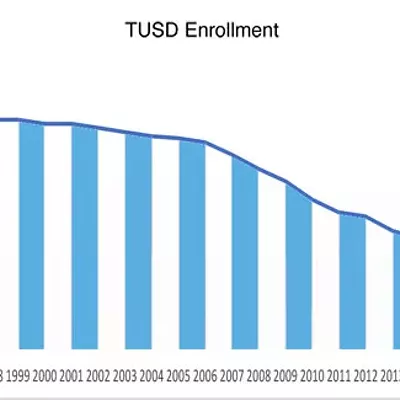After years of slashing state spending, Republican lawmakers and Gov. Jan Brewer have approved a budget that adds a small amount of money to education and social services, while squirreling away a large chunk of money for the uncertain future.
Senate President Steve Pierce, R-Prescott, warmly applauded his chamber for approving the $8.57 billion spending plan for the fiscal year that begins July 1, saying that thanks to the hard work of the Legislature, Arizona is finally on the rebound.
"We passed a budget that did all we could do with education," he said. "We had education in mind; we had public safety in mind. It's a balanced budget—it's not a phony budget. It's all about what is in the future and being prepared for it. We're trying to get Arizona back on its feet and moving forward."
The proposal was a compromise between Republican legislative leaders, who got a whopping $450 million placed in the state's "rainy-day fund" savings account, and Gov. Jan Brewer, who got much of the extra spending she wanted on education, social services and prisons. Brewer signed the budget on Monday, May 7.
In K-12 education, the budget includes $40 million to help third-graders meet new reading requirements. Schools will get $15 million for such things as textbooks, desks and computers. Another $12 million will go toward emergency repairs to school buildings, though funding for new schools continues to be suspended until 2016.
The state university system will get an extra $21 million—but the budget includes the governor's parity funding formula, which will decrease the University of Arizona's share of per-pupil state funding in coming years.
Social services will receive $42 million to backfill lost federal funds for the Department of Economic Security, which are used to pay for emergency family services such as domestic-violence prevention, child-support enforcement, day-care subsidies and fighting homelessness.
Another $39 million goes to the state's program for the seriously mentally ill.
The budget also includes $66 million in future years to build a 500-bed maximum-security prison and add another 1,000 beds in private prisons.
The budget ends with a $243 million surplus, but would leave a projected budget deficit of about $160 million in two years—after the temporary 1-cent increase in the sales tax is scheduled to end, and the state covers projected costs from the federal health-care overhaul.
Republicans drafted the budget in small group meetings to circumvent state open-meeting laws, and did not allow public input or comments, though the House Appropriations Committee heard testimony on a different budget proposal in February.
Rep. Ted Vogt, R-Tucson, said the balanced budget succeeds in both investing in much-needed services, and putting money away to ensure that lawmakers don't have to slash spending once again.
"The next Legislature will have what I call the luxury of coming into a stable budget," he said. "They're not going to have to do any fast moving to figure out how they're going to balance it, because we've taken that long view."
Vogt said that although the budget is based on the most-conservative revenue estimates and allows for only modest growth, there is some increased funding for programs critical to the state, Southern Arizona and Tucson—like the $6 million he helped secure for the University of Arizona medical school in Phoenix.
Democrats, who were shut out of budget discussions and voted unanimously against the main budget bill, said that despite the modest spending increase, Republicans' priorities are out of whack, and their budget shortchanges the state.
Democrats' biggest gripe is the $450 million stashed away in the rainy-day fund. They say it is raining now and that the money could be put to better use by funding revenue-creating and life-saving programs such as adult education, state parks or KidsCare, which have all lost funding in recent years.
"I think the size of the rainy-day fund was understandable considering the conservatives in charge," said Sen. Paula Aboud, D-Tucson. "On the other hand, it is shocking—the stinginess toward children in terms of KidsCare, the stinginess toward education, the stinginess toward UA medical school."
Aboud says the budget doesn't invest in jobs, citing the fact that Republicans wouldn't fund a jobs-training program that she proposed and they initially supported.
"They put $450 million into the rainy-day fund, but they wouldn't put $100,000 into one budget item that would give us 1,300 jobs," she said. "Not one thing they did this session created jobs."
Democrats also unsuccessfully railed against a $50 million sweep from Arizona's portion of a multistate mortgage-fraud settlement. Arizona was awarded roughly $1.6 billion in February, with $98 million of that dedicated to the state Attorney General's Office to help those affected by the foreclosure crisis in a variety of ways.
Arizona was one of the states hit hardest by the mortgage crisis, and Republicans argued that since state coffers were one of the victims, the money should be used to refill them.
"The people who have been harmed have been compensated by that $1.5 billion," Vogt said. "I would say that with a lot of these abusive lending tactics, the state bore a lot of those costs."
Rep. Matt Heinz, D-Tucson, said the budget's biggest failure is not putting more money back into K-12 education, noting that the $55 million being restored isn't much compared to the $2 billion that lawmakers have cut in the past few years.
Heinz, an emergency-room physician at Tucson Medical Center, said another good place to backfill money would be the health-care system. Recent cuts have cost the state millions of dollars in federal matching funds, and have caused several hospitals in the state to shutter their doors, which means lost jobs.
"When you have a surplus, and you can do it, I think it's responsible to put (money) where you can get a long-term investment back from the community—and that's educating people and creating jobs," Heinz said. "I think the Arizona Legislature has failed Southern Arizona again by failing to really prioritize those two areas."










